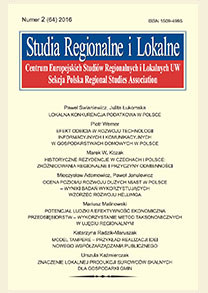Polityczne i gospodarcze następstwa zaboru pruskiego
Economic and Political Consequences of Prussian Partition of Poland
Author(s): Janusz T. HryniewiczSubject(s): Social Sciences
Published by: EUROREG - Uniwersytet Warszawski, Regional Studies Association - Sekcja Polska
Keywords: Prussia; German economy; manor economy; economic and military capacity
Summary/Abstract: After partitions of Poland in 1795 its west territory (Wielkopolska) became a part of Prussia. Poland and Prussia were parts of east European complex of economy, but Prussia was more developed and better organized than Poland. During the XIX century Prussian elites were romantically oriented and dealt with bastion policy which was oriented towards defending the Germans against the Slavs. Prussian state played main role in economy and subordinated it to the military oriented goals. Prussian case was extremely popular among Polish elites at the beginning of XX century. At the base of Prussian patterns the Poles learnt that main actor in economy is not individual unit but the state, and Prussian case was the source of inspiration for strong nationally oriented ideology in Poland after 1918. Research on Polish communes proved that impact of Prussia on contemporary development in Poland was rather damaging than uncourageous.
Journal: Studia Regionalne i Lokalne
- Issue Year: 4/2003
- Issue No: 13
- Page Range: 61-78
- Page Count: 17
- Language: Polish

